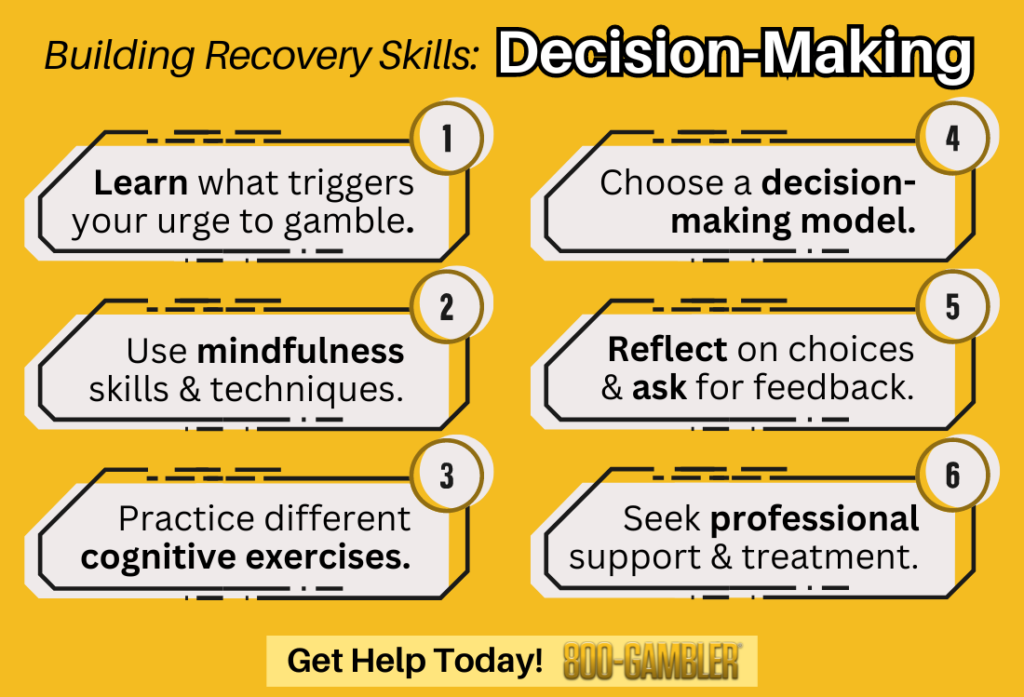Problem gambling can have a profound impact on an individual’s mental health, leading to a cycle of stress, anxiety, and impaired decision-making. The thrill associated with gambling often overshadows the potential negative consequences, making it difficult for individuals to make rational, informed choices. Therefore, one of the best ways to reinforce the recovery process is to work on developing your decision-making skills. Today, we’ll be exploring some specific, actionable strategies to enhance these skills!

Learn What Triggers the Urge
Identifying what sparks the urge to gamble paves the way toward regaining control over your actions. Triggers can include emotional distress, certain environments, or even specific individuals. Once you’ve identified your triggers, you can start working on strategies to manage them effectively. This could involve attending GA meetings to better understand your emotions, avoiding places where you used to gamble (see also: can you ban yourself from a casino?), or limiting contact with individuals who encourage gambling behavior.
Practice Mindfulness
Mindfulness involves focusing on the present moment without judgment. Regular practice of mindfulness exercises, such as deep breathing or meditation, can improve your ability to cope with gambling urges. By practicing mindfulness daily, you can improve your ability to make clear, rational decisions even when faced with the temptation to gamble.
Engage in Cognitive Exercises
Cognitive exercises such as puzzles, reading, and games stimulate the brain and improve cognitive function. They help you think more clearly, improve memory, and enhance decision-making skills. Regularly engaging in such activities can significantly help you make better decisions and resist the urge to gamble.
Make Use of Decision-Making Models
Various decision-making models can also help you make more thoughtful, informed choices. For instance, the “STOP” model involves four steps: Stop, Think, Options, Plan. When faced with the urge to gamble, stop for a moment, think about why you want to gamble, consider other options you have (like calling a friend or going for a walk), and then plan how to implement this alternative option.
Reflect on Your Decisions
Self-reflection is a powerful tool for improving decision-making skills. Reflecting on your decisions and their outcomes helps you identify patterns and make necessary changes. By analyzing your choices, you can gain insights into your thought processes and make improvements where needed. Some effective reflection tools include journaling exercises and creative writing.
Reflection isn’t limited to personal thoughts, either. Don’t hesitate to seek feedback from trusted individuals about your decisions, too. They can provide valuable perspectives that can help you improve your decision-making skills. By incorporating this feedback, you can make more informed decisions and effectively manage your gambling urges.
Seek Professional Treatment
Professional treatment options, including Cognitive Behavioral Therapy (CBT), can be highly useful in managing problem gambling. CBT aims to change harmful thought patterns and behaviors, equipping you with the tools needed to handle gambling urges effectively. Through CBT, you can learn techniques like cognitive restructuring (changing negative thought patterns), exposure therapy (gradual exposure to triggers in a safe environment), and problem-solving skills.
You Can Change!
Improving your decision-making skills is a crucial step towards managing disordered gambling behavior. Remember, while the journey may be challenging, the rewards of improved mental health, better relationships, and regained control are well worth the effort.
If you or a loved one is struggling with a gambling problem, don’t wait to contact 800-GAMBLER. Our toll-free, confidential helpline operates 24/7, and we’re here to connect you to resources that will help you change your life for the better. Reach out to us today!



